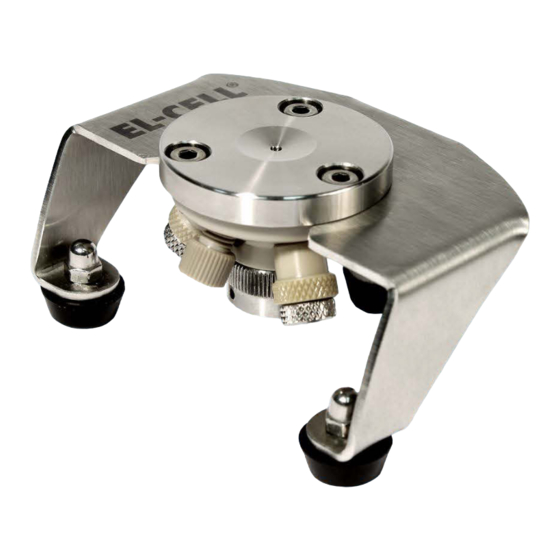Summary of Contents for EL-CELL ECC-Opto-Std
- Page 1 User Manual Release 2.62 Electrochemical Test Cell ECC-Opto-Std November 2016 © 2016 EL-CELL GmbH...
- Page 2 The information in this manual has been carefully checked and believed to be accurate; however, no responsibility is assumed for inaccuracies. EL-CELL GmbH maintains the right to make changes without further notice to products described in this manual to improve reliability, function, or design. EL -CELL GmbH does not assume any liability arising from the use or application of this p roduct.
-
Page 3: Table Of Contents
7 X-Ray Experiments ..................13 8 Further Kits ....................15 9 Components ECC-Opto-Std ................ 16 10 Spare Parts ..................... 17 11 Consumables ................... 18 12 Technical Support ................... 19 13 Warranty ....................19 Page 3 of 19 User Manual ECC-Opto-Std – Release 2.62... -
Page 4: Product Description
Touch screw (CE) (Contact pin WE) The ECC-Opto-Std test cell serves to monitor the optical properties of an electrode material in the course of electrochemical charging. For this purpose, the working electrode (WE) material, which is supported on a meshed or holed current collector, is placed right below the optical window. - Page 5 Optical window Current collector mesh (Aluminium or Copper) 16 mm Spring loaded piston Glass fiber separator Counter electrode (CE) Reference electrode pin Detend feature Working electrode contact pin Page 5 of 19 User Manual ECC-Opto-Std – Release 2.62...
-
Page 6: Features
Connection to potentiostat/battery tester via 2 mm banana sockets, adapters for 4 mm banana sockets are included Temperature operation range -20 to +70 °C Dimensions of the ECC-Opto-Std (mm): Page 6 of 19 User Manual ECC-Opto-Std – Release 2.62... -
Page 7: Safety Precautions
NOTE: Damaged shipments must remain with the original packaging for freight company inspection. List of Components: ECC-Opto-Std test cell with stand, fully equipped for use in both 2 -electrode and 3-electrode (reference) configuration in aprotic electrolytes ECC1-00-0150-A ECC-Opto cell cable... - Page 8 7. O-Ring 6.75 mm x 1.78 mm DIC9013 8. O-Ring 16 mm x 1.8 mm DIC9012 9. Hex wrench 0.9 mm WZG9005 10. Spherical hex screw driver 3 mm WZG9002 Page 8 of 19 User Manual ECC-Opto-Std – Release 2.62...
-
Page 9: Assembly And Connection
Charge a 5 ml syringe with ca. 0.5 ml of electrolyte. NOTE: We recommend single-use PP plastic syringes with low friction silicone pistons. Connect the syringe to the Luer adapter of the filling tube. Page 9 of 19 User Manual ECC-Opto-Std – Release 2.62... - Page 10 Remove the filling tube and close port B with the second WE contact pin. 11. Insert the cell into the stand. 12. Connect the cell to the cell cable as shown in the picture on the following page. Page 10 of 19 User Manual ECC-Opto-Std – Release 2.62...
- Page 11 13. Connect your potentiostat to the 2 mm sockets (1) of the cell cable ( grey: REF; red: blue: CE). Adapters (2) are provided for connection to 4 mm banana plugs. Page 11 of 19 User Manual ECC-Opto-Std – Release 2.62...
-
Page 12: Disassembly And Cleaning
All parts are to be dried immediately after cleaning at 80°C. NOTE: Leaving cell parts in contact with ambient atmosphere while s till being wetted with electrolyte may result in severe corrosion. Page 12 of 19 User Manual ECC-Opto-Std – Release 2.62... -
Page 13: Ray Experiments
8°. Lid with groove List of Components X-ray Kit: ECC1-00-0156-B Beryllium window (22 x 0.2 mm) ECC1-00-0222-A Lid XRD ECC1-00-0127-C Page 13 of 19 User Manual ECC-Opto-Std – Release 2.62... - Page 14 Beryllium is highly toxic and can cause cancer. Take proper precautions when handling the Beryllium window. Avoid direct contact with skin. Carefully collect and dispose properly any Beryllium fragments when accidentally breaking the window. Page 14 of 19 User Manual ECC-Opto-Std – Release 2.62...
-
Page 15: Further Kits
Components Zinc Selenide Kit: ECC1-00-0156-D Zinc Selenide window (22 x 0.3 mm) ECC1-00-0250-B s Lid Zinc Selenide ECC1-00-0127-E Components Calciumfluoride Kit: ECC1-00-0156-E Calciumfluorid window (22 x 0.3 mm) ECC1-00-0250-C Lid Calciumfluorid ECC1-00-0127-E Page 15 of 19 User Manual ECC-Opto-Std – Release 2.62... -
Page 16: Components Ecc-Opto-Std
Cell base ECC1-00-0124-A O-Ring 6.75 x 1.78 mm DIC9013 Stand ECC-Opto-Std ECC1-00-0151-A Feed wire Reference electrode pin ECC1-00-0010-F ECC1-00-0010-G Compression spring (Au) Plug FED9015 ECC1-00-0130-B Touch screw Piston ECC1-00-0128-A ECC1-00-0126-A Page 16 of 19 User Manual ECC-Opto-Std – Release 2.62... -
Page 17: Spare Parts
Feed wire, assy ECC1-00-0010-F Filling tube with syringe (5 ml) for vacuum filling ECC1-01-0001-A Hex wrench 0.9 mm WZG9005 Spherical hex screw driver 3 mm WZG9002 Page 17 of 19 User Manual ECC-Opto-Std – Release 2.62... -
Page 18: Consumables
Current collector mesh, copper (5 pieces) ECC1-00-0328-A/V Current collector mesh, aluminium (5 pieces) ECC1-00-0328-B/V O-Ring 6.75 mm x 1.78 mm DIC9013 O-Ring 16 mm x 1.8 mm DIC9012 Page 18 of 19 User Manual ECC-Opto-Std – Release 2.62... -
Page 19: Technical Support
12 Technical Support Technical support for this product is exclusively provided by EL-CELL GmbH. EL-CELL GmbH Tempowerkring 8 21079 Hamburg - Germany phone: +49 40 79012-737 fax: +49 40 79012-736 e-mail: info@el-cell.com web: www.el-cell.com 13 Warranty For a period of one year from the date of shipment, EL -CELL GmbH (hereinafter Seller) warrants the goods to be free from defect in material and workmanship to the original purchaser.













Need help?
Do you have a question about the ECC-Opto-Std and is the answer not in the manual?
Questions and answers